The Pound’s Path: Navigating the Rich History of UK Currency
The pound, the currency of the United Kingdom, has a rich history that dates back millennia. The pound has played an important role in the economic and cultural history of the United Kingdom, from its humble beginnings to its present global importance. Let us go on a journey through time to learn about the rich history of UK currency.
Evolution and its Origins:
The pound’s history begins in the eighth century, when Anglo-Saxon kings adopted silver pennies as a form of payment. The pound has undergone numerous changes over the years, including changes in weight, design, and value. The term “pound” comes from the Latin word “libra,” which refers to a weight unit.
Table 1: Evolution of UK Currency
| Era | Currency Form | Key Features |
|---|---|---|
| Medieval Period | Silver Pennies | Introduced by Anglo-Saxon kings |
| 17th Century | Gold and Silver Coins | Introduction of guineas and crowns |
| 18th Century | Banknotes | First Bank of England notes issued |
| 19th Century | Decimalization | Shift from pounds, shillings, and pence to decimal currency |
| 20th Century | Decimal Coins and Banknotes | Introduction of decimal coinage and modern banknotes |
| 21st Century | Digital Payments | Rise of electronic transactions and digital currencies |
Key Milestones:
The foundation of the Bank of England in 1694, which marked the beginning of the issuance of banknotes, was a significant milestone in the history of UK currency. These early banknotes were essential in aiding trade and business. The move from the cumbersome system of pounds, shillings, and pence to a decimal-based currency in the nineteenth century simplified transactions and calculations.
Modern Inventions:
Throughout the twentieth century, the United Kingdom continued to modernize its currency system. In 1971, decimal coins were introduced to replace the old denominations. Digital payments advanced in the twenty-first century, with contactless cards and digital wallets becoming increasingly common. The Bank of England also launched polymer banknotes for increased durability and security.

Table 2: Modern UK Currency Features
| Currency Feature | Description |
|---|---|
| Polymer Banknotes | Introduced for longevity and security |
| Security Features | Holograms, raised print, and other anti-counterfeit measures |
| Commemorative Coins | Special coins to celebrate events and honor figures |
| Digital Payments | Contactless cards, mobile payment apps, and online transactions |
Global Importance:
The British pound had a global impact, particularly during the height of the British Empire. It quickly became a popular international reserve currency. While the pound does not have the same level of domination today, it is still an important player in the global financial system.
Finally, the pound’s voyage through history reflects the UK’s economic and cultural evolution. The pound has played an important role in creating the nation’s identity and its place in the global economy, from its humble beginnings as silver pennies to its present digital form. Its illustrious past is still unfolding as the world of banking and business advances.
Read more article at: https://dollarsbag.com/arianna-huffington-net-worth-2023-know-about-biography-age-net-worth-and-more/
Also get more info at: https://www.investopedia.com/terms/g/gbp.asp


